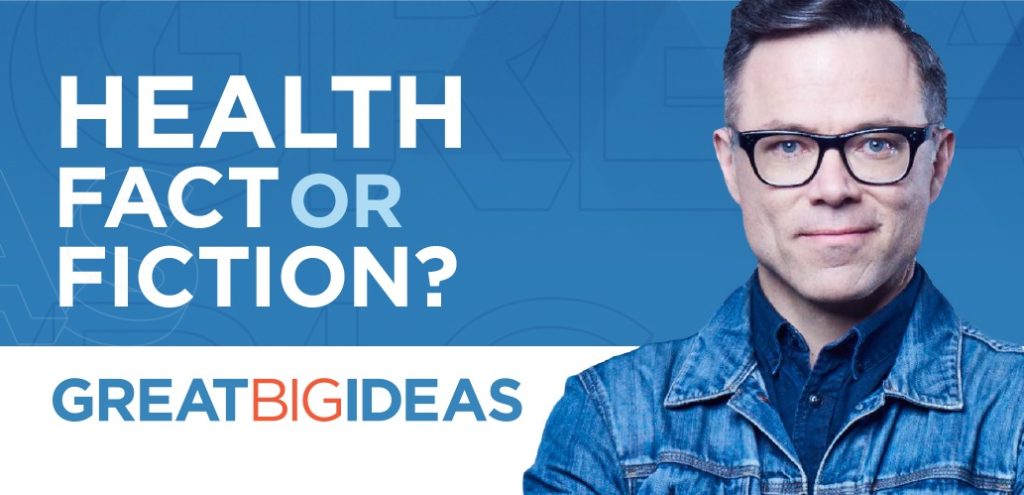
Health Fact or Fiction?: A Q&A with Timothy Caulfield
Timothy Caulfield is the best-selling author of Is Gwyneth Paltrow Wrong About Everything?: When Celebrity Culture and Science Clash and host of the new documentary TV show, A User’s Guide to Cheating Death. He is also a Canada Research Chair in Health Law and Policy, a Professor in the Faculty of Law and the School of Public Health, and Research Director of the Health Law Institute at the University of Alberta. He has published over 350 academic articles on topics including research ethics and public representations of health science.
He’s eager to assure the masses that the loudest voice is not always the correct one, and urges people to exercise caution in an internet age when everyone can be an “expert.” A perennial debunker, he takes aim at celebrities masquerading as scientists, even if those celebrities snap back at him occasionally.
In October of 2017, he came to Hamilton for our Great Big Ideas: Health Fact or Fiction event. We sat down with Caulfield to talk about his approach to finding truth amid ‘fake news’ and what people can expect from his presentation.
A Q&A with Timothy Caulfield
What made you decide to become a “debunker?”
To be honest, I never planned to be a “debunker”. In my work on science and health policy I just became increasing frustrated with all the inaccurate noise that exists in popular culture. For some reason, it drives me nuts! It also became increasingly clear that this pseudoscience has a real impact. Lots of bunk just seems like ridiculous nonsense – Gwyneth’s jade vagina eggs, for example – but it can have a tangible impact on health behaviour. There is a lot of good evidence demonstrating that popular culture affects how we take care of ourselves. This is relevant to all of us.
Is pseudoscience particularly risky when it comes from celebrities? Why?
Let’s be honest, for most of us, celebrities are viewed as credible sources of health information. Most of us know they aren’t experts. Still, they can have a real influence, even when we don’t realize it. One reason for this: they are powerful, and often attractive and share anecdotes that sound like evidence. When Tom Brady says his science-free exercise and nutrition regimen has allowed him to play his best at age 40, that is a compelling story – even if the science doesn’t back him up. And, alas, there is lots of evidence a good story can often overwhelm a mountain of science!
“She has created a powerful, money-making brand that focuses almost exclusively on bunk and spreading misinformation”
Why have you focused on Gwyneth Paltrow? Is there anyone else whose advice we should be wary of?
Gwyneth is such a good example of the place of celebrities in the context of health. She has created a powerful, money-making brand that focuses almost exclusively on bunk and spreading misinformation. Jessica Alba has done the same. Her business, The Honest Company, is built on pseudoscience fearmongering about toxins and chemicals. Tom Brady’s stuff is pretty annoying too, which hurts as I’m a huge fan! To be honest, you can ignore almost all the advice provided by celebrities. Unless they are talking about not smoking, wearing a seatbelt, donating organs, and other similar, straightforward truisms, ignore, ignore, ignore!
What advice would you give people when it comes to trusting health information online?
Take great care. Be aware of conflicts of interest. Look for organizations that summarize and analyze data. I always suggest that people should look for a body of evidence (not just anecdotes), always use critical thinking. Just because something is popular or new doesn’t mean it works. Just because something has been around for centuries, doesn’t mean it works. And testimonials, no matter how compelling, aren’t evidence.
What can health care providers do to help people learn how to sniff out bunk?
I’m a big proponent of being honest about science. To be fair, it is easy for me to say this as I don’t see patients. Still, I believe it is possible to respect different perspectives and worldviews, while still being honest about what actual science says about an intervention. Health care providers play a very important role here.
What should people expect from your talk in Hamilton?
I always aim to make my talks fun and provocative. I love this stuff. I’m completely fascinated by why there is so much science-free noise out there. So I hope that comes across. There will be much debunking, but also an analysis of what got us here. Why do fake news, social media and celebrities have such a huge impact on our lives? How did we get here? What can we do personally and as a community to improve the situation? I will also provide information about what the evidence says about how we can live a healthy lifestyle. There are things that work. Let’s focus on the good stuff!
